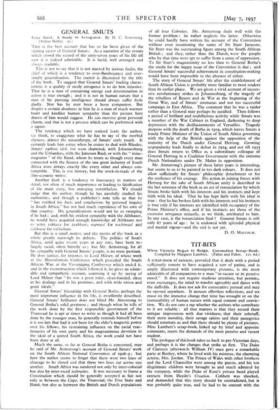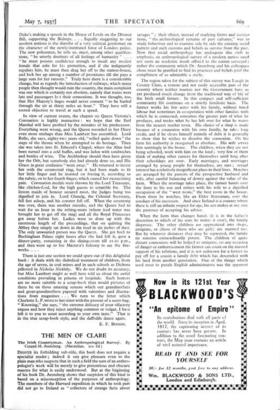TIT-BITS
A SC.RAP-BOOK of extracts, provided that it deals with a period sufficiently remote to have acquired a sort of patina, and is amply illustrated with contemporary pictures, is the most admirable of all companions to a man "in vacant or in pensive mood." It does not require studious attention, but permits, even encourages, the mind to wander agreeably and dance with the daffodils. It does not ask for consecutive perusal and may be opened anywhere. It arouses effortless reflections, and we muse on the immense change that time has wrought or on the immutability of human nature with equal content and convic- tion. We do not care a rap whether the authors who contribute to it are reliable : all that matters is that they record their antique impressions with due vividness, that their sobstuff, their stern morality, their savage satires and their panegyrics should entertain us and that there should be plenty of pictures. Miss Lambert's scrap-book, linked up by brief and apposite comments, meets the demands of the most pensive and vacant student.
The prologue of this book takes us back to pre-Victorian days, and perhaps it is the changes that strike us first. The Duke of Clarence (afterwards William IV) once gave a remarkable party at Bushey, where he lived with his mistress, the charming actress, Mrs. Jordan. The Prince of Wales with Other brothers and the Lord Chancellor were among the guests, and his ten illegitimate children were brought in and much admired by the Company, while the Duke of Kent's private band played extracts from Haydn's Creation. Cobbett was shocked, and demanded that this story should be contradicted, but it was probably quite true, and he had to be content with the Duke's making a speech in the House of Lords on the Divorce Bill, supporting the Bishops. . . . Equally staggering to our modem notions is the diatribe of a very satirical gentleman on the character of the newly-instituted force of London police. The new policeman, he tells us, must, among other .qualifica- tions, "be utterly destitute of all feelings of humanity" . . . " he must possess confidence enough to insult any modest female that asks for hi3 protection, and if she indignantly repulses him, he must then drag her off to the station-house, and lock her up among a number of prostitutes till she pays a large sum for her ransom." Truly here there is a considerable change, but as regards, the introduction of railways, which many people then thought would ruin the country, the main complaint was one which is certainly not obsolete, namely that trains were late, and passengers lot their connexions. It was thought, too, that Her Majesty's lieges would never consent "to be hurled through the air at thirty miles an hour." They have still a rooted objection to travel at such a speed.
In view of current events, the chapter on Queen Victoria's Coronation is highly instructive : we hope that the Earl Marshal will have profited by the mistakes of his predecessor. Everything went wrong, and the Queen recorded in her Diary even more mishaps than Miss Lambert has assembled. Lord Rolle, she says, eighty-two years old, "rolled quite down" the steps of the throne when he attempted to do homage. Then she was taken into St. Edward's Chapel, where the Altar had been turned into a cold buffet, and was laden with sandwiches and bottles of wine. The Archbishop should then have given her the Orb, but somebody else had already done so, and His Grace in great confusion "went away." He returned to invest her with the ceremonial ring, but it had been made to fit her little finger and he insisted on forcing it, according to the rubric, on to her fourth finger, which caused her excruciating pain. Coronation medals were thrown by the Lord Treasurer, bite chicken-fcod, for the high guests to scramble for. The lissom maids of honour secured most, the Judges being too dignified to join in. Lord Glenelg, the Colonial Secretary, fell fast asleep, and his coronet fell off. When the ceremony was over, there was another mistake, and the Queen had to wait for an hour in the robing-room (where iced water was brought her to get off the ring) and all the Royal Princesses got away before her. Ladies were so done up with the enormous length of the proceedings, that on quitting the Abbey they simply sat down in the road in six inches of dust. The only unwearied person was the Queen. She got back to Buckingham Palace eight hours after she had left it, gave a dinner-party, remaining in the dining-room till I 1.20 p.m., and then went up to her Mamma's balcony to see the fire- works. . . .
There is just one section we could spare out of this delightful book : it deals with the diabolical treatment of children, from the age of seven, in coal mines and in such schools as Dickens pilloried in Nicholas Nickleby. We do not doubt its accuracy, but Miss Lambert might as well have told us about the awful conditions prevailing in prisons or hospitals. Such horrors are no more suitable to a scrap-boak than would pictures of them be on those amazing screens which our grandmothers and great-grandmothers papered with valentines and illustra- tions from magazines . . . We turn to the letter which Charlotte L. P. wrote to her sister with the present of a scent-bag. "Knowing," she says, "the extreme delicacy of your olfactory organs and how they reject anything common or vulgar, I have left it to you to scent according to your own taste." That is in the true scrap-book style, and the daffodils dance again.
E. F. BENSON.















































 Previous page
Previous page